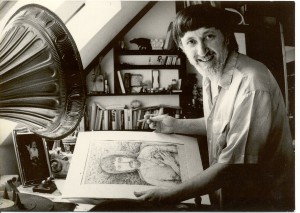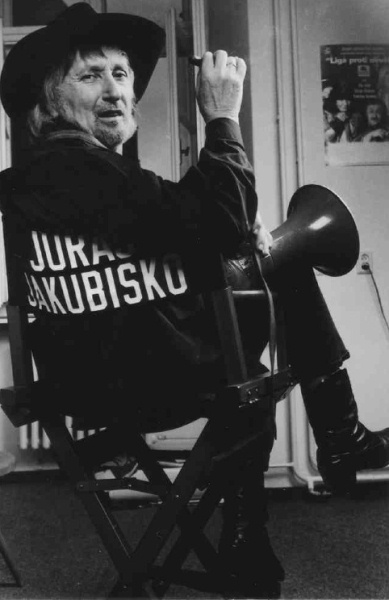Jakubisko’s cinematographic gems adorned by fine arts
Košice will hold the film festival Jakubiskove dni (Jakubisko’s Days) on 23rd–30th March. Within the festival, Juraj Jakubisko will be presented also as a painter. An exceptional exhibition will be followed by screenings, throughout the week, of his famous films that have received dozens of awards. Cinema lovers will enjoy lectures by film experts, and the director himself will share his directorial experience with the audience.
Maestro Director presents his visual art
The festival presents Juraj Jakubisko, a key figure of the European Capital of Culture – Košice 2013, as a visual artist and also as a painter. The director is exceptional not only for his cinematography, but also as a great fine artist – something almost unknown about him. Juraj uses the canvas to render scenes from his own films. He always draws the images, visualised in his head while shooting,  in a diary first. His works include paintings and drawings. The opening of the exhibition of selected works by Juraj Jakubisko is held on 23rd March 2013 at 17:00, at Vojtech Löffler Museum in Košice. The exhibition runs until 12th April.
in a diary first. His works include paintings and drawings. The opening of the exhibition of selected works by Juraj Jakubisko is held on 23rd March 2013 at 17:00, at Vojtech Löffler Museum in Košice. The exhibition runs until 12th April.
Lectures with cinematography experts
The one-week film festival is accompanied by expert lectures at the Aula Maxima of the TechnicalUniversity in Košice. On 25th March 2013, cinema lovers can enjoy a lecture by Juraj Jakubisko on “The future of filmmaking art”. At 10:30, you have a unique opportunity to hear from a director who significantly contributed to Slovak and worldwide cinematography. His exceptional cinematic style is widely recognised abroad as well. Peter Konečný continues the professional discourse entitled “See You in Hell, Friends” on 27th March 2013 at 16:00. The topic for Thursday is “Deserters, Fools, Pilgrims and Birds of Juraj Jakubisko” – writer Peter Michalovič discusses his monograph on Jakubisko at 11:00. He spent three years studying the director’s works and wrote a recollection on Jakubisko and his films. Michalovič, an expert in Jakubisko, was ranked among the 25 most influential Slovaks in 2008. Admission to lectures is free.
Bathory to solemnly open the festival
Historical epic film Bathory, the most expensive film project in Central Europe, solemnly opens the cinema section of the festival on 24th March 2013 at 18:00 at the Ster Century Cinemas. The cinematography Maestro attends the screening of the feature film in person at 19:00. The box-office hit broke attendance records in Czech and Slovak cinemas. The historical drama has won several awards and also had a notable success internationally when it was awarded the prestigious “Best Artistic Achievement” award at the Monaco Film Festival.
Cinematographic gems at the Úsmev cinema
Juraj Jakubisko shot some high-quality short films while studying at FAMU (FilmAcademy). In addition to the renowned ones, the audience can watch his less well-known student films screened on 25th March 2013 at 18:00. Several short films document his early beginnings with directing and screenwriting. At 19:00 follows the comedy Infidelity, Slovak Style (1980) that won the “Laughter Award” at the Czech and Slovak Comedy Film Festival in 1982. With humour, the film criticises hypocrisy, affectation and male pride, and captures the life of a bunch of philandering lumberjacks in the country.
From 26th March 2013, you can enjoy valuable older films. The qualities of the Deserters and Pilgrims narrative film (1968) were also appreciated at the Venice Biennale. The film won many awards, such as Igric 1967 for directing and cinematography, Igric 1968 for screenplay, directing and cinematography, Trilobit 1967 and Trilobit 1968 for screenplay, directing and cinematography, Zlatá Siréna (“Golden Sirene”) for directing, Grand Prix Ledňáček (“Kingfisher”) for directing and cinematography. You can watch this apocalyptic vision of three wars in three stories at 18:00. Jakubisko’s newer film Post Coitum screens at 20:30. This modern controversial story, dubbed “Chilling City Comedy”, is interesting for its attractive topic and ambitious visual style. Its title is derived from the Latin aphorism “Post coitum omne animal triste” (After intercourse, every animal is sad).
Two tragicomedies are screened on 27th March 2013. First, at 18:00, is the newer one, It’s Better to Be Wealthy and Healthy Than Poor and Ill (1992). This film won the Golden Dolphin major prize at the IX Festivale de Cinema de Troia Setuba in Costa Azil, Portugal (1993). Screening at 18:00 is the film Build a House, Plant a Tree (1980), which won the Jury Prize at the International Film Festival in Holland.
On Thursday, 28th March 2013 at 18:00, the audience should brace themselves for A Thousand-Year Old Bee, a historical epic film, a saga of three generations of one family (1887 – 1917), a parable about life in a beehive community. This opus magnum won the Czechoslovak Journalist Award (1984), Czechoslovak Film Critics Award for 1983, Grand Prix Ledňáček, and became the winning film in the Best 1980s Film poll. It was awarded the Golden Phoenix in Venice for art direction and best cinematography, together with the Catholic Award. The epic won the UNICEF Award in Belgrade, and Spanish Confederation of Film Clubs Grand Prix for the festival’s best film in Spain.
The award-winning Birds, Orphans and Fools (1969) screens on 29th March 2013 at 18:00. It takes you back to the Prague Spring period and the Soviet-led Warsaw Pact invasion which crushed it. Jaubisko’s thirteenth opus An Ambiguous Report About the end of the World follows at 20:00. This epic was featured at several film festivals where it won multiple awards (Los Angeles, New Delhi, the Cinematography Award in Montreal, the Golden Dolphin Grand Prix in Pesaro). The black humour scenes alternate with passionate action, unfolding from the fateful story of unrequited love. The tale of two sinful lovers is a parable about the end of the world as predicted by Nostradamus and the Bible.
On the last festival day, 30th March 2013, you are invited to become part of Jakubisko’s debut feature Crucial Years a.k.a. Christ’s Years (1967). The full-length film of a generation-gap drama screens at 18:00. The festival closes at 20:00 by the Czechoslovak epic film I’m Sitting on a Branch and I’m Fine (1989). Admission to award-wining films is only €1.50 at the Úsmev cinema.
About the director
Jakubisko was born on 30th April 1938 in the village of Kojšov, near Košice. He has lived in Prague since 1993, but still feels like a Košice resident. He studied photography at the School of Applied Arts in Bratislava. At the beginning of his career, Juraj was attracted to photography, graphics, puppet theatre, camera, figurative painting, and directing. He studied directing at FAMU (FilmAcademy) in Prague. After graduation in 1966, he became a distinguished author to enrich the national cinematography. Jakubisko has been a member of the EuropeanFilmAcademy since 1998. He has became a phenomenon in his own country and abroad. Jakubisko has won many major international film awards. 


